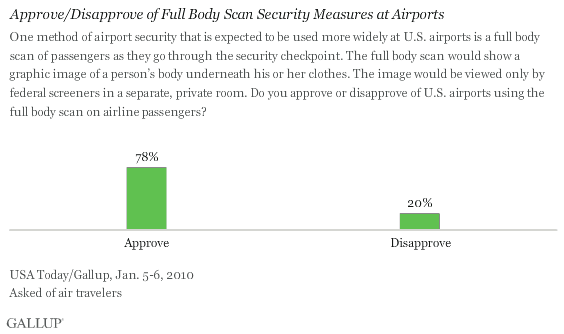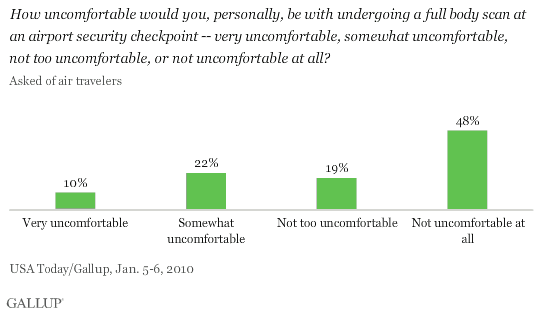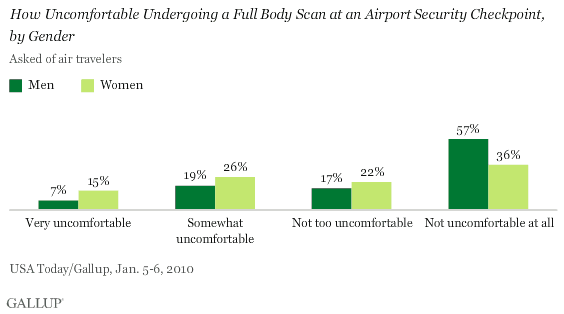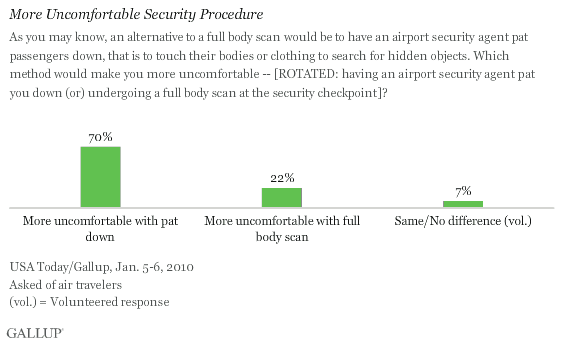PRINCETON, NJ -- In the midst of renewed discussion of heightened security measures to thwart terrorist attacks like the Christmas Day attempt to blow up an airplane over Detroit, 78% of U.S. air travelers approve of U.S. airports' using full body scan imaging on airline passengers.

These results are based on a USA Today/Gallup poll conducted Jan. 5-6, including interviews with 542 regular air travelers, defined as those who have taken two or more air trips in the past 12 months.
"The majority, 67%, say they would not personally be uncomfortable in undergoing such a scan, with close to half (48%) saying they would not be uncomfortable at all."
The poll finds 29% of air travelers saying they are now more concerned about the safety of air travel than they were before Nigerian Umar Farouk Abdulmutallab allegedly attempted to detonate explosives hidden in his underwear. Current airport security measures, such as metal detectors, would not detect the type of explosives involved in the Detroit incident, but a body scan image would have. Thus, there are plans to expand the use of such machines at U.S. airports.
While some have expressed concerns about the implications of full body scans for passenger privacy, given the clarity of the images they would produce, airline passengers themselves do not seem fazed. Seventy-eight percent approve of the procedure, which was described to them as showing a "graphic image of a person's body underneath his or her clothes" that would be "viewed only by federal screeners in a separate, private room."
Additionally, the majority, 67%, say they would not personally be uncomfortable in undergoing such a scan, with close to half (48%) saying they would not be uncomfortable at all. Ten percent say they would be very uncomfortable if subjected to such a search.

There is a gender difference in the assumed level of discomfort, with female air travelers more likely than male travelers to express discomfort (41% to 26%). A majority of male air travelers say they would not be uncomfortable at all.

Perhaps as a result, men are also slightly more likely than women to approve of the use of body scan images (81% to 74%).
Air travelers would most likely not be required to undergo body scans at airports; they could instead opt to be searched or "patted down" by an airport security agent. Among air travelers, the choice is clearly in favor of body scans -- 70% say they would be more uncomfortable with being patted down, while 22% would be more uncomfortable in undergoing a body scan.

One reason air travelers generally approve of using full body scans may be because they believe scans will be effective at preventing terrorists from smuggling explosives or other dangerous objects onto airplanes. Eighty-four percent say scans would be effective in this regard, including 38% who say they would be very effective. Thus, air travelers have a compelling reason to potentially counter any personal modesty issues they have related to body scans.
Bottom Line
The attempted terror attack on a U.S. flight on Christmas Day revealed limitations in current security procedures on U.S. flights, and may have ushered in a new era of heightened airport security. One major part of the solution -- airport body scanners -- is not without controversy but is something most air travelers would take in stride.
Survey Methods
Results are based on telephone interviews with 2,017 national adults, aged 18 and older, conducted Jan. 5-6, 2010. For results based on the total sample of national adults, one can say with 95% confidence that the maximum margin of error is ±3 percentage points.
For results based on the sample of 542 adults who have taken two or more air trips in the past year, the maximum margin of error is ±5 percentage points.
Interviews are conducted with respondents on land-line telephones and cellular phones
In addition to sampling error, question wording and practical difficulties in conducting surveys can introduce error or bias into the findings of public opinion polls.
